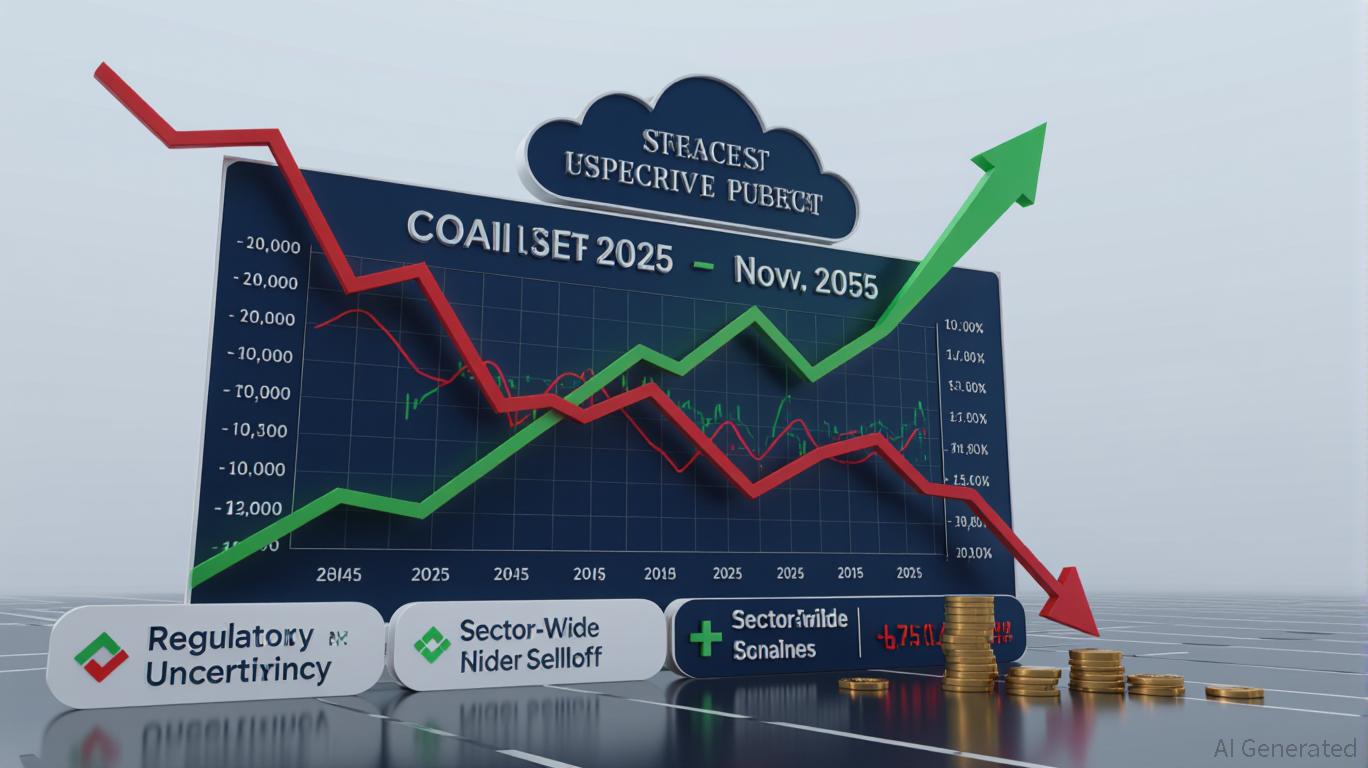Dash Plunges 33.89% Over the Past Week as Earnings Fluctuate and Strategies Evolve
- DoorDash (DASH) fell 33.89% in 7 days despite Q3 revenue of $3.45B and adjusted EPS of $1.28. - CEO Tony Xu prioritizes AI integration and global expansion into grocery/retail, driving short-term volatility. - Strategic bets include autonomous delivery, Instacart partnership, and AI-powered SRE agents for operational efficiency. - Technical analysis shows 30-day -24.6% drop vs. 3-year 217% growth, with stock trading 33.7% below fair value. - Earnings beats generated short-term gains but failed to sustain
As of November 12, 2025,
The company has been maneuvering through a challenging market environment during its Q3 financial results, reporting $3.45 billion in revenue, an adjusted EPS of $1.28, and an adjusted EBITDA of $754 million. Although several key figures surpassed analyst forecasts, the share price lagged due to higher investments in technology and new business areas. CEO Tony Xu highlighted the significance of ongoing investments in AI and international expansion, aiming to boost unit economics and broaden reach into sectors like grocery, retail, and convenience.
Both investors and analysts have paid close attention to DoorDash’s strategic initiatives, especially its moves into autonomous delivery and its new collaboration with Instacart for grocery services. The company is also utilizing AI-powered SRE agents, such as those from Deductive AI, to improve incident management and operational performance. These strategies are designed to optimize operations and enable scalable growth, though they have contributed to recent market fluctuations.
Technical analysis indicates that the stock has undergone notable volatility in recent months. The 30-day return of -24.6% points to waning momentum, while a three-year total return of 217% signals strong long-term prospects. With a fair value estimate of $302.53, the stock appears to be undervalued by 33.7%. Nevertheless, a lofty price-to-earnings ratio of 100.2x raises questions about possible overvaluation based on traditional metrics.
Backtest Hypothesis
A back-test of the event “DoorDash (DASH.O) Earnings Beat Expectations” from January 1, 2022, to November 12, 2025, shows limited statistical significance in abnormal returns. Only three qualifying “earnings–beat” events occurred (2022-08-01, 2023-08-02, 2024-08-06), with average abnormal returns reaching a high of +12% around the 11th trading day. However, these gains quickly diminished, and by the 30th day, cumulative abnormal returns had dropped to -7.4%. The small sample size and lack of strong statistical significance indicate that while earnings beats tend to prompt short-term gains, sustained investor confidence may rely more on effective strategy execution than on quarterly results. This is consistent with DoorDash’s current emphasis on long-term investment and improving unit economics, suggesting that while immediate market reactions matter, lasting growth will depend on the company’s ability to successfully implement its new products and technologies.
Disclaimer: The content of this article solely reflects the author's opinion and does not represent the platform in any capacity. This article is not intended to serve as a reference for making investment decisions.
You may also like
Bitcoin News Today: Bitcoin Poised for Major Move: Will It Surge or Plunge at $108K?
- Bitcoin consolidates near $104.5K, below $108K resistance, as tightening Bollinger Bands signal potential breakout. - A $108K+ break could drive BTC to $110K-$112K with ETF inflows and reduced miner selling pressure supporting accumulation. - Failure to hold $104K support risks a pullback to $100.5K, with soft ETF demand or renewed miner sales as key triggers. - Solar stocks like Emeren and Canadian Solar draw equity market attention amid mixed earnings and debt concerns.

Tokenized Equities Climb to $10 Billion, Putting Regulators in a Legal Gray Area
- Kraken's xStocks platform, a joint venture with Backed, surpassed $10B in transaction volume four months post-launch, tokenizing equities like Tesla and Meta . - The platform enables 24/7 trading and fractional ownership across Ethereum , Solana , BNB Chain, and Tron , with $2B in onchain activity and 45,000 holders. - Legal ambiguity persists as tokenized stocks are treated as derivatives, not direct securities, with experts warning of liquidity risks and regulatory challenges. - Kraken's cautious focus
Bitcoin Updates: Dubai Court's $456 Million Asset Freeze Marks a Turning Point in International Crypto Regulation
- Dubai's Digital Economy Court froze $456M in TrueUSD reserves, alleging mismanagement by Aria Commodities, a firm controlled by Matthew Brittain. - Funds were transferred via Hong Kong-based First Digital Trust between 2021-2022, sparking legal disputes over whether reserves were converted to illiquid assets. - The ruling underscores global regulatory focus on stablecoin transparency, as Techteryx claims constructive trust while Aria faces scrutiny over opaque transactions. - Trump-linked entities like A

COAI's Sudden Price Decline: Managing Immediate Fluctuations and Sustained Strength
- COAI Index fell 54% by November 2025 due to C3.ai's $116.8M loss, lawsuits, and regulatory uncertainty from the CLARITY Act. - Short-term selloffs were amplified by sector-wide risk aversion, though Binance's smart money account profited $3.125M from COAI trades. - Long-term resilience stems from 50+ corporate partnerships advancing AI adoption and indirect benefits from rising AI R&D investments in biotech . - Investors must balance regulatory risks with COAI's ecosystem strength, as C3.ai's struggles c
